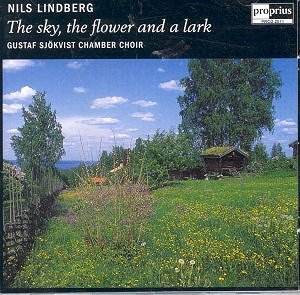Nils
Lindberg trails through his musical output a number of influences
and voices. Initial ambitions to write epic symphonic works faded
when the jazz world discovered his skills as a pianist. He made
a succession of jazz recordings in the 1950s and tours and concerts
continued for many years. A visit to Spain in 1990 led to a ‘Damascus
Road’ experience in which the richness to be explored in writing
for choirs was revealed to him. He wrote a large scale Requiem
in 1999. This choral attraction is married with his Dalarna
folk heritage. It was natural for him to set the folksongs of
his homeland.
The
first seven tracks of this disc are freshly imagined arrangements
of Dalarna folksongs previously set by Hugo Alfvén. His
predilection is for a sweet white sound delivered in radiance
and innocence by the Sjökvist choir. The music has all the
innocence of a Finzi, Rutter and Vaughan Williams partsong but
sung in a boyish distanced way like Swingle II singing classical
but without the pop balance. After the songs comes As You Are
prefaced by a jazz band accompanied cool saxophone solo. Then
in swings the choir singing in sweetly close harmony. A Love
Supreme takes similar curves but without the instrumental
solos and with the choir adding in whispered spoken words. The
delightful lightness of this singing continues through the remaining
tracks. The most striking of which is the smilingly jazzy Vocalise
in which the choir play orchestra to the tandem solos of the wordless
singing of Margareta Jalkeus and the saxophone of Anders Paulsson.
This is a deeply attractive piece. In the UK it might raise the
odd memory of the Mike Sammes Singers and Sing Something Simple
but banish these mundane thoughts in favour of such attractive
music.
The
disc closes with the Höga Visan (The Song of Songs)
setting words from the Bible. The saxophone returns with a small
jazz ensemble including double bass and the composer playing piano.
The choir sing four sequences from The Song of Songs. The saxophone
takes the role of the exalted singer delighting in cool virtuosity
(try tr.18 where the sax shadows the choir). The composer adds
some real depth in his far from anodyne and surprisingly dissonance
strewn solo at 10.01.
Choirs
looking to kick over the traces yet wanting something eminently
singable should seek out this CD without delay.
Sweet
music, suavely expressed. Not bland. Eminently attractive. Superbly
recorded.
Rob
Barnett
